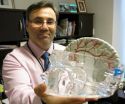(Press-News.org) People and institutions who are marginal members of a high-status or well-esteemed group tend to emphasize their group membership more than those who are squarely entrenched members of the group, according to new research published in Psychological Science, a journal of the Association for Psychological Science.
Research has long shown that people prefer to be in groups that are thought to have higher status or cultural value as a way of boosting self-image and projecting an impressive image to others. Despite the fact that separations between groups are often arbitrary, and that there may be as much variation within a group as between groups, membership in particular groups can convey significant personal and social benefits.
Psychology researcher Paul Rozin of the University of Pennsylvania was prompted to investigate the ways in which individuals and institutions communicate their group membership as a result of many years of observation, after "noticing the behavior of people just promoted to a better position, or just after receiving a degree, or being admitted to a relatively exclusive group."
In one study, Rozin and co-authors Sydney E. Scott, Hana Zickgraf, Flora Ahn, and Hong Jiang, all of the University of Pennsylvania, examined how universities promoted themselves in the "About Us" sections of their own websites.
They found that master's universities — which are at the border of the university category, offering some master's-level programs but typically few doctoral-level programs — were more likely to emphasize "university"when referring to themselves. Specifically, master's universities used the word "university"in 62.2% of self-references, whereas national universities — which offer undergraduate, master's, and doctoral degrees — used the word in only about 46.4% of self-references.
Similarly, the researchers found that small international airports were more likely to emphasize their "international" status than were large airports.
The researchers also found evidence of the phenomenon at the individual level in undergraduates' descriptions of their universities.
Culturally, Harvard University is a well-known, even quintessential, member of the "Ivy League" — many people don't realize that the University of Pennsylvania is also a so-called Ivy. Rozin and co-authors asked undergraduate students at each institution to describe their university. For some students, the directions were phrased in a private context: "Please write down 7 things you think of when you think of your university." For others, they were phrased in a public context: "Please write down 7 things you think of when you describe your university to other people."
The data showed that Penn students were more likely to mention "Ivy League" or "Ivy" in describing their university than were Harvard students.
The researchers believe this phenomenon likely occurs in many other situations. They hypothesize that individuals may emphasize marginal membership in high-status professional groups, including "greater use of doctor titles by osteopaths, dentists, and chiropractors as opposed to medical doctors" and "greater display of officer status by lieutenants as opposed to colonels, and may also highlight marginal membership in high-status socioeconomic group membership, including "greater display of wealth by the nouveau riche than by 'old money.'"
"We believe that effects like those illustrated here are widespread, although it is sometimes difficult to collect the appropriate data," the researchers write.
INFORMATION:
This research was supported by funds from the Positive Psychology Center at the University of Pennsylvania.
All data and some materials have been made publicly available via Open Science Framework and can be accessed at https://osf.io/28ejf/. Some of the materials are not posted because of copyright concerns. The complete Open Practices Disclosure for this article can be found at http://pss.sagepub.com/content/by/supplemental-data. This article has received the badge for Open Data. More information about the Open Practices badges can be found at https://osf.io/tvyxz/wiki/view/ and http://pss.sagepub.com/content/25/1/3.full.
For more information about this study, please contact: Paul Rozin at rozin@psych.upenn.edu.
The article abstract is available online: http://pss.sagepub.com/content/early/2014/08/19/0956797614545131.abstract
The APS journal Psychological Science is the highest ranked empirical journal in psychology. For a copy of the article "Asymmetrical Social Mach Bands: Exaggeration of Social Identities on the More Esteemed Side of Group Borders" and access to other Psychological Science research findings, please contact Anna Mikulak at 202-293-9300 or amikulak@psychologicalscience.org.
Group identity emphasized more by those who just make the cut
2014-08-27
ELSE PRESS RELEASES FROM THIS DATE:
Baicalin suppresses iron accumulation after substantia nigra injury
2014-08-27
A growing number of studies have shown that excessive iron is closely associated with the pathogenesis of Parkinson's disease. Previous studies from Chunyan Guo and co-workers from Capital Medical University in China have shown that baicalin prevented iron accumulation after substantia nigra injury, reduced divalent metal transporter 1 expression, and increased ferroportin 1 expression in the substantia nigra of rotenone-induced Parkinson's disease rats. However, the relationship between iron concentration and transferrin expression is still unclear. Based on the previous ...
Factors predicting functional recovery of the upper limb after peripheral nerve injuries
2014-08-27
Currently, the main factors thought to be associated with outcomes after the repair of peripheral nerve injuries are the age of the patient, mechanism of injury, nerve injured, injury location, defect length, repair time, repair method, operation technique, and repair materials. However, despite numerous studies of outcomes after the repair of peripheral nerve injuries, there is no agreement regarding the independent predictors of a good prognosis, and the dose-effect relationship of the predictors has not been quantified. A study by Dr. Bo He and co-workers from the First ...
Gifts that generate gratitude keep customers loyal
2014-08-27
Despite major retailers investing tens of millions of dollars a year into loyalty programs, they are a dying breed, with customers struggling to see the benefits of signing up, according to QUT research.
But benefits that stimulate gratitude in customers have the power to strengthen the seller-customer relationship and ensure loyalty, researchers Dr Syed Hasan, Professor Ian Lings, Associate Professor Larry Neale and Dr Gary Mortimer, from QUT's School of Advertising, Marketing and Public Relations, found.
Lead researcher Dr Hasan, a Postdoctoral Research Fellow, said ...
Piglet weaning age no bar to litter frequency
2014-08-27
University of Adelaide research has shown that piglets can be weaned later with no negative effects on sow birthing frequency.
The outcome of the study at the University's Roseworthy campus, published in the journal Animal Reproduction Science, is an important finding for pig producers. It allows improvements in piglet health and welfare without loss of production.
"Sows don't usually start their oestrous cycles again during lactation, only coming on heat after their piglets have been weaned," says Ms Alice Weaver, PhD candidate with the School of Animal and Veterinary ...
Measurement at Big Bang conditions confirms lithium problem
2014-08-27
The field of astrophysics has a stubborn problem and it's called lithium. The quantities of lithium predicted to have resulted from the Big Bang are not actually present in stars. But the calculations are correct – a fact which has now been confirmed for the first time in experiments conducted at the underground laboratory in the Gran Sasso mountain in Italy. As part of an international team, researchers from the Helmholtz-Zentrum Dresden-Rossendorf (HZDR) studied how much lithium forms under Big Bang conditions. The results were published in "Physical Review Letters".
Lithium, ...
Gamblers are greedy bird-brains, University of Warwick research finds
2014-08-27
Gamblers are greedy bird-brains, University of Warwick research finds
Gamblers show the same tendencies as pigeons when they make risky decisions, new research has shown.
Researchers, led by Dr Elliot Ludvig of the University of Warwick's Department of Psychology, conducted tests that found that both human gamblers and pigeons were 35% more likely to gamble for high-value than low-value rewards.
Published in Biology Letters, the researchers argue that the test results show the important role that memories of previous biggest wins and losses play when we make risky ...
The thunder god vine, assisted by nanotechnology, could shake up future cancer treatment
2014-08-27
Hepatocellular carcinoma (HCC) is the second leading cause of cancer-associated death worldwide. These regrettably poor prognoses are due to the difficulty in treating this cancer using conventional chemotherapeutic drugs such as doxorubicin, epirubicin, cisplatin, 5-fluorouracil, etoposide or combinations therein. This may be attributed to that the conventional medicines are not able to reach in a sufficient concentration in the liver tumor cells at levels that are not harmful to the rest of the body. Considering the large percentage of patients that are deemed ineligible ...
DTU researchers film protein quake for the first time
2014-08-27
One of nature's mysteries is how plants survive impact by the huge amounts of energy contained in the sun's rays, while using this energy for photosynthesis. The hypothesis is that the light-absorbing proteins in the plant's blades quickly dissipate the energy throughout the entire protein molecule through so-called protein quakes. Researchers at DTU Physics have now managed to successfully 'film' this process.
Both plants, algae and bacteria contain light-absorbing proteins which play a role in photosynthesis and thus how the organisms produce energy. However, it has ...
A prescription for better stroke care
2014-08-27
TORONTO, Aug. 27, 2014 – Stroke patients are 70 per cent more likely to continue taking their stroke prevention medications one year later if they have a prescription in hand when discharged – according to researchers at St. Michael's Hospital and the Institute for Clinical Evaluative Sciences (ICES).
Using data from 11 stroke centres, researchers determined how many Ontarians were taking their medications one week, one year and two years after having a stroke. The results reveal the importance of simple interventions, such as giving a prescription to a patient before ...
The roots of human altruism
2014-08-27
VIDEO:
Sakis play the group service game.
Click here for more information.
Scientists have long been searching for the factor that determines why humans often behave so selflessly. It was known that humans share this tendency with species of small Latin American primates of the family Callitrichidae (tamarins and marmosets), leading some to suggest that cooperative care for the young, which is ubiquitous in this family, was responsible for spontaneous helping behavior. But it ...






